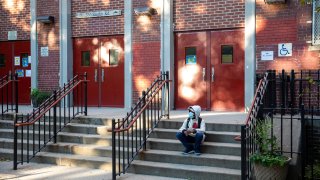
- Educators may play a "central role" in spreading Covid in schools where social distancing isn't followed and masks aren't worn.
- Vaccinating teachers and staff may help prevent outbreaks in schools, a new CDC study said.
- The findings come just over a week after the CDC unveiled new guidance on how schools can safely reopen for in-person learning.
School teachers and staff may play a "central role" in transmitting Covid-19 in schools where social distancing isn't followed and face masks aren't worn. Vaccinating them against the disease could help return students to the classroom safely, according to a new federal study published Monday.
The U.S. Centers for Disease Control and Prevention investigated the coronavirus' spread within eight Georgia public elementary schools in the same school district between Dec. 1 and Jan. 22, which included 24 in-person learning days. During this period, the average number of cases per 100,000 residents in the county increased nearly 300%, the study said.
The federal health agency, along with state and local public health departments, found nine Covid-19 "clusters" involving 13 educators and 32 students at six of the eight elementary schools.
The median cluster size — defined as three or more linked Covid-19 cases — was six people, and an educator was the "index patient," or the first identified case, in four of those clusters, the CDC found. A student was the first patient in one cluster, while the other four clusters had an unidentifiable index patient.
All but one of the clusters involved "at least one educator and probable educator-to-student transmission," the study found.
Get Tri-state area news delivered to your inbox. Sign up for NBC New York's News Headlines newsletter.
"Educators played an important role in the spread of Covid-19 in the schools. Covid-19 spread often occurred during in-person meetings or lunches and then subsequently spread in classrooms," CDC Director Rochelle Walensky told reporters at a briefing later Monday. '"The two main reasons for the spread of Covid-19 in these schools were inadequate physical distancing and mask adherence in the schools."
Money Report
She said students weren't able to practice social distancing because the classes were too full and the desks weren't placed at least six feet apart.
In the study, the CDC researchers said they conducted interviews with parents, educators and school principals and studied seating charts, classroom layouts, physical distancing and compliance with recommended mask use during in-person learning to determine case links.
They found that all nine of the clusters involved "less than ideal" adherence to social distancing recommendations. Students sat less than 3 feet apart and, in many cases, the virus' spread among students could have spread during small-group sessions, according to the study.
The findings come just over a week after the CDC unveiled new guidance on how schools can safely reopen for in-person learning despite the spread of the virus. Among the many recommendations, the CDC advises districts to phase in their reopening plans in accordance with the severity of the outbreak in their areas.
It also says schools should adopt "essential elements" in resuming in-person learning, including wearing masks, physical distancing and monitoring the level of spread in the surrounding community.
While the CDC advised states to prioritize vaccinating teachers and staff "as soon as supply allows," the guidance did not recommend it for reopening. The study published on Monday, however, suggested that vaccinating educators could be important for protecting the most at-risk while reducing interruptions to in-person learning and potentially preventing the virus' spread in schools.
"Although not required for reopening schools, COVID-19 vaccination should be considered as an additional mitigation measure to be added when available," researchers wrote.
— CNBC's Will Feuer contributed to this report.






